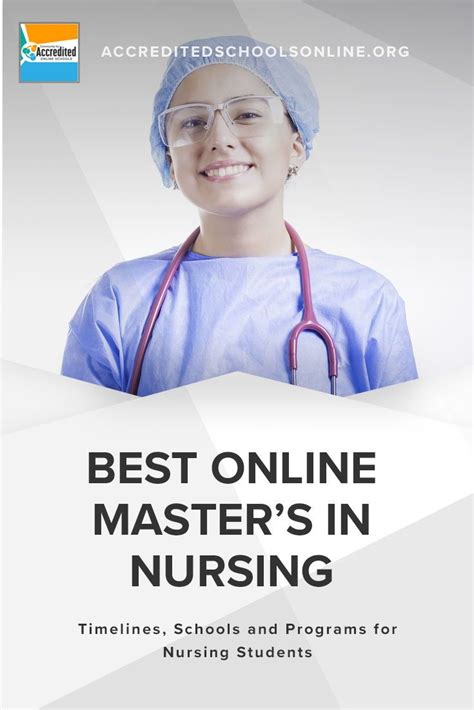Are you a registered nurse aspiring to advance your career with an advanced degree? An online master's in nursing is an increasingly popular option, offering flexibility and access to specialized knowledge. This comprehensive guide will explore the benefits, program types, admission requirements, curriculum, career opportunities, financial considerations, and tips for succeeding in online nursing master's programs. Whether you're seeking professional growth or a career change, this article will provide you with the information you need to make an informed decision about pursuing an online master's in nursing.
Benefits of Pursuing an Online Master's in Nursing
Pursuing an online Master's in Nursing (MSN) offers numerous benefits for working professionals seeking to advance their careers.
Flexibility: Online programs provide unparalleled flexibility, allowing students to complete their studies at their own pace while balancing their work and personal commitments. This convenience is particularly valuable for nurses who may need a flexible schedule to accommodate demanding work hours.
Accessibility: Online programs break down geographical barriers, making it possible for nurses from any location to pursue an MSN. This accessibility is especially convenient for nurses living in remote areas or those who prefer to study from the comfort of their homes.
Career Advancement: An MSN is a valuable credential that opens doors to leadership and advanced nursing roles. Nurses with an MSN qualify for specialized positions, such as nurse practitioners, nurse anesthetists, and clinical nurse specialists, which offer increased responsibilities, autonomy, and earning potential.
Specialized Knowledge: Online MSN programs offer a wide range of specializations, allowing nurses to tailor their education to their specific interests and career goals. These specializations include advanced practice, administration, education, and informatics, among others.
Cost Savings: Online programs can be more cost-effective than traditional on-campus programs, as they often eliminate the need for commuting, parking, and other campus-related expenses.
Peer-to-Peer Learning: Online programs facilitate peer-to-peer learning through virtual discussion boards and online collaboration tools. This interaction provides students with opportunities to exchange ideas, ask questions, and engage in meaningful discussions with their peers.
Types of Online Master's in Nursing Programs
Online MSN programs come in various types, each with its unique focus and requirements.
Pre-licensure MSN Programs
Pre-licensure MSN programs are designed for individuals who have not yet obtained their nursing license. These programs combine undergraduate nursing education with advanced nursing coursework, preparing students to become registered nurses.
Post-licensure MSN Programs
Post-licensure MSN programs are intended for registered nurses who already hold a bachelor's degree in nursing. These programs typically focus on advanced nursing practice, research, or leadership and do not require additional prerequisite coursework.

MSN to DNP Programs
MSN to Doctor of Nursing Practice (DNP) programs are designed for nurses who wish to pursue a terminal degree in nursing. These programs provide advanced clinical training and prepare graduates for leadership roles in nursing practice, research, and healthcare policy.
The type of MSN program suitable for you will depend on your career goals, prior education, and licensure status.
How to Choose the Right Online Master's in Nursing Program
Selecting the right online MSN program is crucial to ensure that it aligns with your individual needs and aspirations.
Accreditation: Accreditation by a recognized nursing accreditation body is essential. Accreditation ensures that the program meets rigorous standards of quality and rigor.
Specialization: Consider the specializations offered by the program and choose one that aligns with your career goals. Programs may offer specializations in areas such as family health, adult-gerontology, or critical care.
Program Length: Online MSN programs can vary in length, typically ranging from 18 to 36 months. Consider the time commitment required and ensure that it fits within your schedule and other commitments.
Faculty and Student Support: Look for programs with qualified faculty who have expertise in your chosen specialization. Strong student support services, such as academic advising and technical assistance, are also important.
Cost and Financial Aid: Investigate the program's tuition, fees, and estimated total cost. Explore financial aid options, including scholarships, grants, and student loans.
Reputation and Reviews: Research the reputation of the program among nurses and industry professionals. Read student reviews and testimonials to get a first-hand perspective on the program's quality and effectiveness.
Carefully evaluating these factors will help you select the online MSN program that best suits your specific requirements and sets you on the path to career success.
Admission Requirements for Online Master's in Nursing Programs
Admission requirements for online MSN programs vary, but generally include:
Unrestricted Registered Nurse License
All applicants must hold an unrestricted Registered Nurse (RN) license in good standing in the state where they plan to practice.
Baccalaureate Degree in Nursing
Most programs require a bachelor's degree in nursing from an accredited institution. Some programs may accept applicants with non-nursing degrees, provided they have significant nursing experience.
Minimum GPA
Programs typically require a minimum GPA in previous coursework, often around 3.0 on a 4.0 scale.
Letters of Recommendation
Recommenders should be able to attest to your academic ability, clinical skills, and professional conduct.
Personal Statement or Essay
The personal statement provides you with an opportunity to explain your motivations for pursuing an MSN and how it aligns with your career goals.
Resume or CV
Submit a professional resume or CV that outlines your education, work experience, and relevant skills.
Additional requirements may include prerequisite coursework, certification in specific areas, or a minimum number of years of nursing experience.
Curriculum and Coursework in Online Master's in Nursing Programs
Online MSN programs typically follow a rigorous curriculum designed to provide students with advanced knowledge and skills in nursing practice.
Core Courses
Core courses cover foundational concepts in advanced nursing practice, including:
Advanced Health Assessment and Diagnostics
Pathophysiology and Pharmacology for Advanced Practice Nursing
Theoretical Foundations of Advanced Practice Nursing
Health Policy and Advocacy
Nursing Research
Specialization Courses
Specialization courses delve into specific areas of nursing practice, such as:
Family Nurse Practitioner
Adult-Gerontology Acute Care Nurse Practitioner
Clinical Nurse Specialist
Nurse Educator
Nurse Administrator
Nurse Informatics
Clinical Practicum
Clinical practicum provides supervised clinical experience in a healthcare setting, allowing students to apply their knowledge and skills in real-world scenarios.
Successful completion of the curriculum and clinical practicum prepares graduates to take on advanced nursing roles and make significant contributions to the healthcare industry.
Career Opportunities with an Online Master's in Nursing
An MSN qualifies nurses for a wide range of career opportunities, including:
Advanced Practice Nurses
Advanced practice nurses (APNs) provide comprehensive patient care, including diagnosis, treatment, and management. APNs include nurse practitioners, clinical nurse specialists, and certified registered nurse anesthetists.
Nurse Educators
Nurse educators teach nursing students and practicing nurses at various levels, from undergraduate programs to professional development courses.
Nurse Administrators
Nurse administrators oversee the planning, organization, and management of healthcare facilities and nursing departments.
Nurse Informaticists
Nurse informaticists use technology and information systems to improve patient care, streamline healthcare processes, and support clinical decision-making.
Nurse Researchers
Nurse researchers conduct research to advance nursing practice and develop evidence-based interventions.
An MSN opens doors to a diverse range of career paths, allowing nurses to specialize in areas that match their interests and aspirations.
Financial Considerations for Online Master's in Nursing Programs
Pursuing an online MSN requires a financial investment. Here are some factors to consider:
Tuition and Fees
Tuition and fees vary widely depending on the program and institution. Some programs offer flat-rate tuition, while others charge per credit hour.
Technology Costs
Online students may need to invest in a laptop, tablet, and reliable internet access to participate effectively in the program.
Opportunity Cost
Consider the potential loss of income if you choose to pursue the program part-time or reduce your work hours.
Financial Aid and Scholarships
Explore financial aid options such as scholarships, grants, and student loans. Many universities offer financial assistance to eligible students.
Carefully assessing these financial considerations will help you plan and budget effectively for your MSN journey.
Tips for Succeeding in an Online Master's in Nursing Program
Succeeding in an online MSN program requires dedication, time management, and effective study habits.
Time Management: Create a structured schedule to ensure you allocate sufficient time for studying, completing assignments, and participating in online discussions.



